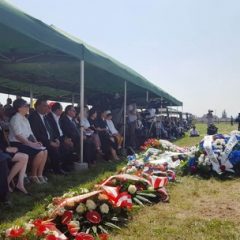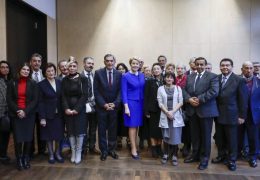International Memorial Service on August 2, 2018 in Auschwitz-Birkenau on the Occasion of the 74th Anniversary of the Murder Mission to exterminate the Sinti and Roma on 2 August, 1944
 On 2 August 2018, the Central Council and the Documentation and Cultural Center of German Sinti and Roma under the direction of Romani Rose with delegation of 50 people, including survivors of the Holocaust, participated in the International Roma Remembrance Day in Auschwitz-Birkenau. In addition to the survivors, numerous board members of the national and member associations of the Central Council of German Sinti and Roma were present at the memorial service. The Memorial Day is being prepared by the Documentation and Cultural Center of German Sinti and Roma in cooperation with the Association of Roma in Poland. Many representatives of the diplomatic corps as well as various international delegations were present.
On 2 August 2018, the Central Council and the Documentation and Cultural Center of German Sinti and Roma under the direction of Romani Rose with delegation of 50 people, including survivors of the Holocaust, participated in the International Roma Remembrance Day in Auschwitz-Birkenau. In addition to the survivors, numerous board members of the national and member associations of the Central Council of German Sinti and Roma were present at the memorial service. The Memorial Day is being prepared by the Documentation and Cultural Center of German Sinti and Roma in cooperation with the Association of Roma in Poland. Many representatives of the diplomatic corps as well as various international delegations were present.
On 2 August 2018, the Central Council and the Documentation and Cultural Center of German Sinti and Roma under the direction of Romani Rose with delegation of 50 people, including survivors of the Holocaust, participated in the International Roma Remembrance Day in Auschwitz-Birkenau. In addition to the survivors, numerous board members of the national and member associations of the Central Council of German Sinti and Roma were present at the memorial service. The Memorial Day is being prepared by the Documentation and Cultural Center of German Sinti and Roma in cooperation with the Association of Roma in Poland. Many representatives of the diplomatic corps as well as various international delegations were present.
Speaking on behalf of the survivors of the Holocaust was Rita Prigmore. As a small child she together with her twin sister became the victim of Nazi medical experiments. Rita Prigmore survived but her entire family was murdered. Speaking as a survivor of the Holocaust she appealed to politics and society for humanity in dealing with refugees: “We live in a time when politicians build walls to win votes. Politicians accuse people who come to us from great misery of abusing the welfare state and of “asylum tourism.” […] They tell us that our lives would be safer if we parted ways with others. We should send the refugees back in order to ensure our happiness and prosperity. In my opinion that is wrong! We have to act human and build a Europe that has a human heart! ”
Beate Klarsfeld underlined the joint persecution by the Nazis of Sinti and Roma as well as of Jews; both groups were persecuted and murdered for the same racist reasons and with the same methods. And it is true for both minorities that they are threatened until today by violent anti-Semitism and anti-Gypsyism: “If then representatives such as the Italian Interior Minister demand to register Sinti and Roma in Italy separately again, only to then regret that he ‘unfortunately has to keep’ those who are Italian citizens, he is part of a tradition of capture and deportation, which is very reminiscent of the time of fascism” according to Beate Klarsfeld.
Dunja Mijatović, Council of Europe Commissioner for Human Rights, emphasized in her speech that a visit to the Auschwitz-Birkenau State Museum, not only recalls the duty of remembering but also gives the feeling of “having to act in the spirit of that remembering” to help future generations to face the prejudices and hatreds that made the Holocaust possible and that caused so much suffering to our fellow human beings just because they were Jews, Roma or otherwise not considered appropriate to fit into in the monstrous plans of the Nazi Regimes.”
The Chairman of the Central Council of German Sinti and Roma, Romani Rose, particularly welcomed the large number of young participants: “I am pleased to see that more than 250 young Roma from twenty European countries have come here for this commemoration. This is a clear signal of our common European values. It is important for all of us that all our young people know their history in order to take responsibility for the present. Above all, this is also a clear signal against the increasingly violent antiziganism and the morbid nationalism that is rampant in Europe.” Rose expressly shared the criticism of Federal President Frank-Walter Steinmeier and the President of the Federal Constitutional Court, Andreas Voßkuhle, on the increasing brutalization of the language, in particular the hate speech on the Internet. “By targeted extreme right provocations, the limits of legal system are tried to be moved and revoked. It is fatal and an additional threat to our democracy and our values if politicians from democratic parties then try to even overtake these extremists on the right. This destroys our Christian values and undermines our rule of law” Rose said.
For the speeches by Beate Klarsfeld, Rita Prigmore and Dunja Mijatović please go to https://bit.ly/2O2K4KZ.
Background:
From March 1943 to July 1944, the National Socialists abducted 23,000 Roma and Sinti from eleven European countries to Auschwitz. Nearly all lost their lives. On August 2, 1944, the remaining 2,900 Sinti and Roma in section B II e of the Auschwitz-Birkenau concentration camp were murdered. A previous attempt to take 6,000 Roma and Sinti to the gas chambers on 16 May, 1944, failed due to the resistance of the prisoners. In the weeks that followed, 3,000 of the inmates involved in the uprising were classified as “fit for work” in selections by SS physicians and taken to slave labor in other concentration camps in the Reich, Buchenwald, Mauthausen, Ravensbrück, Sachsenhausen and Dachau. In Auschwitz remained 2,900 Roma and Sinti, mostly children, their mothers and old people. On the night of August 2 to August 3, 1944, the SS murdered them in the gas chambers and burned the bodies in a pit next to Crematorium V.

